








Cedar Ridge Beagles
c/o Toni Perdew
crbeagles@gmail.com
(the best method to reach me is via e-mail)
Bedford, Iowa
Click
here for additional contact information.
Our premises are monitored via video
surveillance for your puppy's safety!
Toni Perdew
3005 Lexington CT
Bedford, IA 50833
|
To search this page, type in a word or
phrase above and click the button. Or, scroll down through the questions.
Works best in Internet Explorer. Press ALT and S to find repeated
occurrences.
-
How soon can we
pick up our new puppy?
Puppies should not leave their littermates until they are at least 8
weeks old. Until this age, they are in need to learning socialization rules
from their littermates. If taken away too early, puppies are more prone to
become biters and whiners, as they didn't learn needed rules from their
siblings. For their health as well, they should be allowed this fun and
low-stress time with their brothers and sisters.
-
Will we get to
see pictures of our puppy as he/she grows up, before we pick him or her up?
Yes! We try to take pictures approximately every two weeks while puppies are
with us. Don't hold us "exactly to the day," as this is just what we try to
do. My family's school, church, community, and on-farm obligations often get
us off schedule. When new pictures are taken, resized/cropped, and uploaded
to the web site, we e-mail the families to let them know new photos are on
the web site. See this page for more information about our
picture-taking schedule.
-
What health care
will our puppy have received before leaving CR Beagles?
We will send you an updated health record right before or right after
you get your puppy. Before puppies leave us, they will have received at
least the first vaccination in their puppy series, plus will have been
dewormed several times. We also give puppies medication to prevent coccidia
while they are here (a common cause of puppy diarrhea...read
more here). These things will all be noted on your health report. Please
take a copy of your health report to your vet at your first visit so he/she
knows the puppy's health history.
-
When will our
puppy need to see a vet?
We like our puppies to see a vet within 72 hours of leaving CR Beagles.
This allows your vet to evaluate the puppy's health and how he/she is
handling leaving our environment. It also gives your vet the opportunity to
discuss the puppy's vaccination and deworming schedule with you. Puppies
MUST have a series of vaccinations through about 4 months of age to help
prevent diseases. After this series, most dogs can have once-yearly
vaccinations to maintain their immunity, but puppies need the extra help
that this series provides. **Remember to take the health history we give you
to the vet for him/her to review.
-
Do you use
Advantage/Frontline, and if not how soon can we use Advantage because we do
not want fleas in our house?
We've never had fleas, but I do recommend monthly treatments because fleas
can be picked up from the yard, parks, vet's office, etc. When we send/give
you your puppy's health record, check to see if the puppy has had a
Frontline treatment. It should not be closer than 4 weeks between
treatments.
-
Do I need to buy
a carrier?
S/he will come with a small travel carrier if she flies to you that will
work for several weeks. (If you pick her up in person, buying a carrier
might be a good idea.) After that, we find that a large carrier (for a
20 lb dog or so) is good to have for future vet visits over the years, and
for traveling in general.
-
Do we need to buy a
metal cage for crate training? If so, how large? And what is crate training?
I do like crate training for the times that nobody is in the house during
the workday/school day. Some people only do this during potty training, and
others use the crate as the puppy's home while the family is away. This
page
has some very good articles about it.
Also, see our links at the bottom of our
Puppy Development page.
Dogs don't like to potty in their
"bedroom" areas, so most will try to hold it if they can until you get home.
Initially, it might be hard for a puppy to go that long. But shortly, they
will learn your schedule and will wait for your home arrival to go.
Most beagles will mature to between 15 and 35 lbs, so buy a crate that will
be comfortable for your puppy even when she's mature.
-
How do we potty
train a puppy?
Visit here for some links about
potty training. Searching the Internet will result in many good articles
that will help.
-
What size
Harness/leash should I buy?
Initially, an 8 to 12" collar (very small) is the right size. Our beagle
puppies from 8 to 10 weeks old generally weigh between 3.5 and 5.5 pounds,
so a big collar will come right off her head. We buy collars and leashes
from Wal-Mart or any pet store for our puppies at home.
-
Do I need to buy
a cozy doggy bed?
Oh, they do love those! Some puppies might confuse that with a chew toy, so
don't buy an expensive one until you see what she'll do. :-)
-
Do you have a
good food recommendation and vitamin in mind?
Puppies need to be on a good
quality food formulated JUST for puppies for at least four
months. This used to be recommended for a full
year, but research has begun to show that we are feeding our
puppies "too well" and they are growing too fast. Growing
too fast can contribute to joint problems later in life.
Please talk to your veterinarian to learn what he/she
recommends. I had always heard that we should feed a puppy
formulation for 7-12 months until I went to a small animal
specialist in 2017 and learned about the recent research and
got his recommendation....stopping puppy food at
FOUR MONTHS of age. I was surprised!
Most vets have not heard of these recent studies, but it's
good to know and to ask your vet for ideas.
From just prior to weaning until our
puppies leave us, they experience a variety of foods and
supplements including puppy milk replacer formula, fresh
goat milk from our farm, canned puppy food
(small amounts only), probiotics, Nutrisource Small/Medium
Breed Puppy, and Diamond Naturals Small Breed Puppy. Initially, we
are more concerned with getting them to eat solid food than
worrying about "which food" they start eating.
Don't Worry! :-) The most
important components of our feeding program are those that
your puppy is eating right before he/she leaves us, because
you should try (as best as you can) to mimic that diet for
a week or so before changing the puppy's diet. At that
time, we typically are just feeding our puppies a mixture of
two dry puppy foods or (more often) just our most-favorite dry puppy food,
pictured below.
Interesting fact...Studies suggest we should keep
medium-sized breeds of puppies on
a puppy formulation until they are at least four months. On the advice from a
small animal specialist (veterinarian that only served small animals, no
livestock), I switch puppies from a puppy food to an adult food formulated for
"all life stages" at FOUR months. "All life stages" foods meet puppies'
nutritional needs, but aren't quite as supportive of overgrowth or
excessively-fast growth. Slower growth is actually better for life-long
soundness.
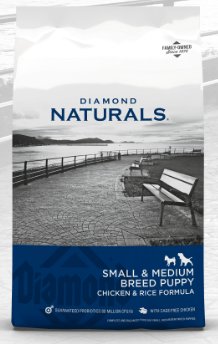 |
Our puppies are accustomed to
Diamond Naturals
(Chicken and Rice) Small/Medium Breed Puppy Food
(5 stars out of 5 stars, rated by Dog
Food Advisor)
See
http://www.diamondpet.com/dealer_locator/ for online and
physical addresses.
Most
Menards
stores carry it, as well as many farm-oriented stores, such
as Tractor Supply, Orscheln Farm and Home, local farmer's elevators/co-ops, etc.
Many people also order from various sources online.
If you are soon
to receive a puppy, we recommend that you try to find
a small bag of this food your puppy is currently eating to use for a week.
We will send a little bit with you to get you started,
too.
After a few days, you can begin mixing it with the food
you plan to feed throughout your puppy's first year until the small bag is
gone.
|
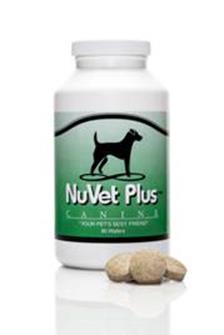 |
We also recommend
NuVet
antioxidant supplements for immune
support above any other "vitamin" on the market!
Scroll down or click the bottle (left) for information about
high-quality vitamin/antioxidant supplements.
NuVet supplements usually must be ordered online (see
information at the link), but a very few veterinarians carry them
as well. If you would like to give NuVet supplements, we
recommend ordering them directly from NuVet. It is easier and faster than
driving to the vet, who may or may not carry them (and may
try to sell a different supplement to you that might not have all the benefits of NuVet).
These supplements are cold-pressed, not cooked. Therefore, the antioxidants/prebiotics/minerals
are not damaged by heat. |
How Much Food
and How Often? (See above update regarding possible brand
change)
-
We keep Diamond Naturals Small Breed
Puppy Food (unless an exception above exists) with the puppies almost all
the time until they are 8 or 9 weeks old. We need to offer
food most of each day to ensure that all puppies in the
litter get enough food, rather than having one slower-eating puppy
not have enough. This also helps prevent any puppies from
feeling that they need to rapidly eat as much food as they
can, out of fear that they will be hungry when there isn't
any food available if the other puppies eat it all.
-
At 8 to 10 weeks, beagle puppies should
be offered 3 meals per day, depending upon their
weight/size.
Feeding "meals" after a puppy leaves littermates will help
you with potty training. For a good eater, 2 meals per
day may be sufficient. But 3 meals per day is even better for 8 to 10 week old puppies under 6 lbs, in our opinion...and
some people feel continuing with 3 meals per day is best for
up to the 6-month age.
-
Check the feeding suggestions for the
brand of puppy
food you choose. The daily recommended amount will be listed
by either puppy weight and age, or else by the puppy's
weight at maturity.
~"Most" of our puppies are
eating between 2/3rds cup and 1 cup per day when they leave
us around 8 weeks of age.
~Our beagle puppies "typically" weigh between 4.5 and 5.5
lbs at 8 weeks. Puppies this size are usually eating about
3/4ths of a cup per day, sometimes more.
~The small beagles might weigh 3.5 to 4 lbs at 8 weeks, and
they may be eating only a half or two-thirds of a cup per day.
~Look at your puppy's mother/father (link is on the web page
that your puppy's pictures are shown on) for their weights
to estimate your puppy's mature weight.
~I have found that the recommendations on the bags are
often too much for beagles, and the beagles get fat when
fed that amount. For growing puppies, it's best to evaluate
the puppy's condition every 3 or 4 days halfway between
feedings or at the same time each evaluation day. If he
looks like he is losing weight, up the feed a bit. If he is
staying the same and looks good, keep the volume the same.
~I don't like to see puppies' ribs, but it's ok to see a bit
of hourglass shape when viewed from above. On adult beagles,
there should be a definite waist/hourglass shape. Puppies
tend to be more round, though. For the first several months,
puppies typically do have a bit of chub, but we don't want
them to be obese because that is hard on their joints.
~It is hard to feel confident about food volume, so I recommend
asking the vet to tell you if your puppy is too fat or too
thin those first couple months after coming home, each time
you visit the veterinarian. After
puppies are 5 or 6 months old, they have more of an adult dog
conformation, and you can more easily see just by looking for
that waistline.

Examples of Dog
Food Brands, and Comparison
A
high-quality puppy food is essential for the first few months.
-
Diamond also makes the
Chicken Soup For The Pet Lover's Soul dog foods, which
have good ingredient lists.
-
NutriSource Small/Medium Breed Puppy
has a very good ingredient list as well.
-
We
love
Diamond
brand (Lamb and Rice) Large Breed Puppy for puppies that are 3
months
old and older. Not because beagles are large, but because
this food is outstanding!
-
Purina
One, Science Diet, Eukanuba,
Solid Gold, and Iams are also popular (though
corn
is a major ingredient in them....yes, even the Science Diet,
unless you buy the right version directly from a
veterinarian), and your veterinarian might
have a suggestion that he/she prefers.
Lamb and
Rice or chicken and rice foods (no corn in the ingredients) are often recommended for breeds of dogs with
large ears that lay down, like beagles.
Blue Buffalo offers several good puppy foods. We also like
the quality of
NutriSource puppy food, and often supplement our puppies with
that when nearby stores run out of Diamond Naturals.
However, millions
of puppies have been raised on non-specialty store-bought food, and you sure can choose
that route as well as long as it's specifically formulated for puppies.
How do you know if a food is good?
Look at
the ingredients...if "corn" or "corn meal" (or similar) is
in the first few ingredients, it isn't viewed to be as good as if those
ingredients were lower on the list. Better yet, avoid a
corn-based feed entirely and look instead for rice. Or,
consider a diet of food totally without corn, rice, wheat,
etc. This can be accomplished via prepared foods such as
Natures Variety, or by careful research on your part and
feeding a diet of raw meats.
Foods I Like
Good Ingredient List


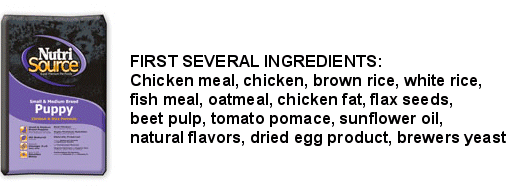
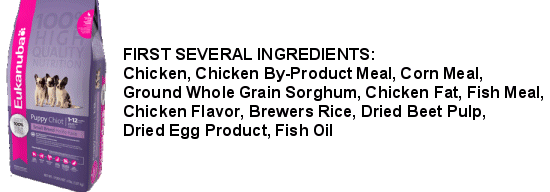
Common Foods I Like
Less
(below)
But are still formulated for puppies and will probably be fine.
(see the prominent location of "corn"
in ingredients):



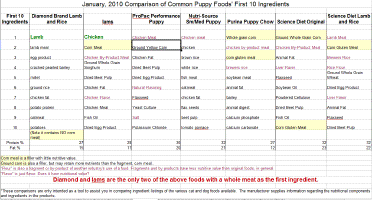
Click the image above for a comparison of several popular
puppy foods' first 10 ingredients and their PRICE (around
2013).
Check out
http://www.dogfoodadvisor.com for
reviews of dog foods. I don't know if this site is truly
independent or if it's sponsored by dog food manufacturers
yet. If it's independent, it's kind of a neat site!

How long should I feed puppy food?
Four months? Seven months? One year?
This is very controversial. In 2017, a small animal
specialist told me that he recommends STRONGLY that puppies
be changed from a puppy formulation to an "all life
stages" formulation at 4 months of age. He said puppy
foods are too rich, and are making puppies grow too quickly
and attain sizes larger than nature intended. This leads to
health issues later in life. Most mixed-species
clinics don't know about all the studies he has read, and
still recommend 7 months to a year on puppy food.
When we
get to keep/raise one,
we have chosen to switch our puppies to an "all life stages"
food (Diamond Naturals Chicken and Rice) at
4-5 months of age because of
what the specialist described to us.
It would be best to ask your veterinarian what he/she
thinks, research, and decide what you feel is best.
What about "grain free" foods?
Please read the
AKC Letter about grain-free foods, 2018, and consult
with your veterinarian.
2020 Update: Still concerns about a link between grain-free
diets and heart problems.
What about a raw diet for our puppy?
I don't recommend raw diets for "puppies,"
but if you want to go to the work
and/or pay for a raw diet for a mostly-grown puppy or an
adult dog, there are merits to it (and also grave concerns).
This would be a good question to ask your veterinarian.
Web MD for Pets regarding Raw Diets for Dogs

Vitamins and/or Antioxidant
Supplements
Puppy foods are supposed to
be complete, but they are cooked. Cooking the kibble damages
some of the ingredients, causing likely nutritional gaps in
puppy foods. If you are going to give a vitamin to bridge
those gaps, why not give the best
one you can?
An excellent
vitamin we definitely support is made by NuVet Labs.
This product can help puppies develop stronger immune systems, which
can help your puppy be healthier AND can even assist the
vaccinations your puppy receives in providing the
highest-possible immune protection. These supplements are the best
I've seen, as they are cold pressed (not cooked)
which means the ingredients aren't damaged by heat. They are
BOTH vitamins and antioxidant supplements in one tasty
treat.
http://www.nuvetlabs.com/
1-800-474-7044
You may have to use my order code if you order via phone:
23915
Or, order by clicking the bottle image, below:

NuVet Plus: Natural, Powerful
Immune System Support
-
Veterinarian Recommended and Scientifically Formulated
to Provide Everything Your Pet Needs for Optimal Health!
-
NuVet Labs’ Goal is to Help Increase Your Pet's
Longevity and Quality of Life. Many breeders will only
honor their health guarantee if the puppy's families can prove that their
puppy is getting NuVet vitamins daily through receipts for purchase.
I do not require that. But, that's a testament to how strongly breeders feel about the quality of
these vitamins.
-
When a puppy is moved away from its mother and siblings to
live with its new family, the immune system is weakened by the stress of
adoption and exposure to new/different bacteria and viruses in its new home. These are
pathogens for which the puppy’s body has not yet developed antibodies, and
it is widely recognized that the immune system is less effective in times of
stress. So starting NuVet Plus now can be important to helping your puppy
grow into a healthy adult.
-
NuVet Plus for Canines
provides the very best human-grade, natural ingredients
available, and utilizes the latest advances in medical,
veterinary, and nutritional science.
-
NuVet products help put pets on the “path to perfect
health” and support their development through every
stage in life.
-
NuVet Plus is not available in stores or directly to the
general public. You can only purchase NuVet Plus when
you get a recommendation only from a pet professional,
which is why I think you might need my order code,
23915, if you want to
order.
-
Thousands of the nation’s top veterinarians and other
pet industry professionals use NuVet Plus® for their own
pets and recommend it to their clients’ pets!
-
NuVet Plus is Natural – No Artificial Sweeteners or
Fillers
-
Receive a 15% discount off every order if
you choose their "Autoship" option. I believe you can set the frequency of
the shipments.
-
More about NuVet Plus
and more information (opens in a new window).
-
Seizures...I know of at least three dogs (one Maltese, 2 beagles) that
stopped having seizures after they began receiving NuVet vitamins! (as
of 2020)
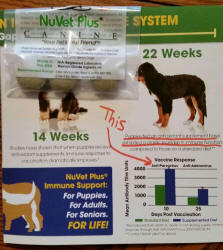
This video published by NuVet Labs covering why NuVet Plus can
help growing puppies and all life stages of dogs:
Congratulations from NuVet Labs on Your
New Puppy! on Vimeo
Veterinarians discuss NuVet Plus:
https://vimeo.com/180076051

What If Our Puppy Doesn't Eat Or Drink
Well
At First?
Normally, there is very little problem with eating habits in the new
home environment. But just like when we humans are away from
home, puppies will sometimes be too caught up in their new
place and the excitement to eat and drink on their normal schedule.
If possible, offer a couple teaspoons of plain or vanilla yogurt with active
cultures (most brands have active cultures, including the Wal-Mart store brand)
mixed with puppy kibble once or twice daily. This not only is a treat that might get your puppy to eat,
but the cultures are also good for digestion during this time of stress.
*This seems to work well: Buy a can of dog or puppy food (any brand) and
mix no more than "a couple tablespoons" with his/her dry kibble, stirring it up so the canned
food coats almost all of the dry kibbles
(don't put too much on, or the puppy might get diarrhea).
Or, do the same with a couple tablespoons of cottage cheese.
You can also buy puppy or all-species milk replacer powder from a vet or pet supply store, and
sprinkle that on the puppy's dry kibble (then stir to coat the food) to make it
more appealing. See image below (don't put too much on, or the puppy might get
diarrhea):
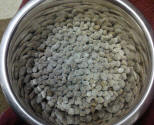
One food caution is to not give canned puppy food unless "needed" to entice him
to eat...and then only in controlled amounts. Canned puppy food is not very nutritious, and also puppies will overeat
if allowed to. This can lead to bloated stomachs, gas, vomiting, and diarrhea,
and can require a trip to the emergency room. It is a good idea to have canned
puppy food on hand, but if you use it, we recommend mixing no more than 2 tablespoons of it
with about 1/4-1/2 cup of dry food so the canned food coats the kibbles. This
would only be necessary if he was not eating very well due to his new
environment. Sometimes they do that for a day or two.
We've also had people put canned or fresh cooked (cooled) chicken broth over the
dry kibbles, and even using a little broth or tuna juice in water if needed to
get the puppies to drink.
Again, because this is very important!
PLEASE DO NOT FEED YOUR PUPPY CANNED PUPPY
FOOD in unlimited amounts soon after receiving him/her.
Drastic
changes in their diets can cause severe digestive upset. Do keep a
can of soft food on hand to use to tempt the puppy to eat
if he/she is off feed. But give just a couple tablespoons at
a time to prevent overeating and bloating. If the puppy eats soft food
until he bloats, he could begin a cycle of vomiting/diarrhea
that could lead to blood sugar problems and anemia which
could be fatal.
-
What toys should
we have on hand?
Have some simple toys for her to play with and to satisfy her chew desire.
"Greenies" can make their stools green, so might best be avoided until potty
training is complete for the sake of your carpet. :-)
There are lots of stuffed animal type toys, and firm chew toys that are
great for dogs at Wal-Mart and pet stores/vet offices. We've heard that
rawhide chews are not good for puppies, because as they swallow the small
pieces created by tearing them up, they can get irritated bowels from the
sharp edges. Make sure toys don't have plastic pieces unless you only use
them during supervised play. Puppies are very good at getting the 'squeaker'
out of toys and can swallow the squeaker and choke or get bowel
obstructions.
Visit this guide to
dog chew toys. Some favorites we hear about are Nylabones and
Kongs. You
don't need a lot of toys. Just a few good ones will be quite sufficient.
-
Do you have a list of supplies that might help us shop
before our puppy comes home?
Yep, we have an ever-evolving list of ideas for you on
this page.
-
What should I take to the airport with me to pick my puppy up
if he/she is flying?
We have compiled a list of things to help you prepare. Scroll toward the
bottom of our Shipping page.
-
Is my puppy accustomed to being around cats?
We have cats both outside and inside, and the puppies see them every day and
also can come right in contact with them when we have the puppies in the house.
Normally, our neutered male cat comes right up to the puppies and they see him
and go for him as if they think he's their mother. He then jumps up onto a piece
of furniture as if to say "Ha ha! You can't reach me, you poor
vertically-challenged puppies!" Sooner or later, the cat gets right into the
middle of things. He does bat them with his front feet, but he keeps his claws
in. Gradually, the puppies figure out that he is absolutely no fun, and that all
he wants to do is to bite their tails because those wagging things just HAVE to
be a cat toy.
I imagine your cats will investigate and then get where he can't reach them.
Eventually, they'll put the puppy in his place and then they will all coexist
well. That has been my experience, anyway. :-)
Click here to view a video clip of one of our puppies with his cat friend in his
new home:
Guinevere the cat and Zelda, the beagle puppy
-
Where else can I
find answers to questions in general?
Searching the Internet is a superb way to get answers to questions about
training, health, treating minor health issues, etc. We have collected info
and made a few educational pages that are listed on our
Site Map page that could help, too.
-
We have heard
that AKC-registered dogs are better than other registries' dogs. Is this
true? Does the registration association matter?
AKC's web site says that AKC registration is not to be
considered a guarantee of quality.
AKC is a registry body. A
registration certificate identifies the dog as the offspring of a known sire
and dam, born on a known date. It in no way indicates the quality or state
of health of the dog.
All of the dog registries are companies
that make a profit from storing dog pedigrees and issuing pedigree
certificates. So the dogs' quality and their health is totally dependent
upon the knowledge and skill of the breeders of the dogs. I've seen some
terrible-quality AKC dogs, and some absolutely beautiful APRI-registered
dogs. The association doesn't have any bearing upon that.
An example of how dogs from other registries can be the same quality as AKC
dogs might be that some of our beagles are registered with AKC, APRI, and
UKC (triple registered). This doesn't mean that they are necessarily better
than a dog we own that might just be UKC registered....it just means that
I've paid money to three different companies to get their registration
completed with each of the three companies.
Also, AKC shows are geared around "beauty." In an AKC show, the dog is
judged on its conformation and color, for example. But in a UKC show, the
dog is judged not only on it's "looks," but also on how well it behaves and
does its job (works) in the area that the breed specializes in.
In my opinion, if you aren't planning to show, you should not be concerned
with "which" association a dog is registered with, and instead should be
more interested in the quality and disposition of the puppy and/or its
parents, and the trustworthiness and knowledge of the breeder you buy from.
More about some registration associations here.
-
What is the
living environment your adult beagles have?
Our adult beagles are NOT raised in above-the-ground cages, as some breeders
do. We do keep our adults in fenced-in areas (to prevent unwanted
pregnancies and to avoid exposure to viruses, protozoa, and other germs
found in the environment), and they have room to exercise and are let out
into a play area twice daily for fun and even more exercise. This whole
procedure helps us keep our dogs healthy and as free of germs as possible.
They have a heated building in the winter. In the summer, their pens are
surrounded by marigolds, zinnias, and canna flowers. :-) In the
winter....well, Iowa is not very pretty in the winter. :-(
We do not have our dogs on cement, because it's bad for their joints.
It would be easy to clean, but we don't feel it's healthy for them. Instead,
their areas have a tiny gravel about the size of a pea or up to marble sized, over a base of
larger gravel. This footing is softer, easy to maintain, and we can
frequently add new and clean footing to it as needed. It's kind of like big
pieces of kitty litter. The play area has a deep sand cover for them to run
and play on.
E-mail us if you have a good question to add here.
|